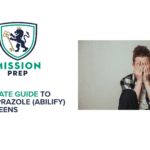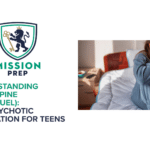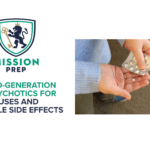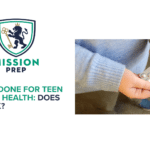Recognizing Psychosis in Teens: How to Intervene

Psychosis can involve a range of symptoms that affect how someone views reality, which can be extremely distressing to experience as a teen and witness as a caregiver. If it comes on suddenly and you’re not familiar with the symptoms of psychosis, you might be unsure about how to help your teenager. Sometimes their symptoms will emerge slowly – in these instances, it’s an easy mistake to dismiss them as a ‘phase’ of depression or even just ‘teen years.’
Understanding the symptoms of psychosis will help you recognize what’s going on and when it’s time to get professional help. This is crucial because psychosis can be indicative of many different psychiatric and neurological conditions that call for fast interventions. Fortunately, there’s a range of ways to treat psychosis professionally, and loved ones can play a significant role by being supportive at home. With the right support, many people with psychosis have positive outcomes from treatment.
To help you understand psychosis and recognize the signs in teens, this page will explore:
- What psychosis is and its causes
- Signs of psychosis in teens
- How you can talk to your teen during psychosis
- The types of support available for teens with psychosis

What Is Psychosis?
It’s not completely known what causes psychosis, but it’s believed to be triggered by having an excess of dopamine in the brain, a chemical involved in managing your mood, movement, motivation, cognition, sleep, and more.2
Research indicates that between 15 and 100 people out of 100,000 experience psychosis each year. It usually first presents between someone’s late teens and mid-twenties, but it can occur at younger and older ages when there are other disorders and illnesses at play. However, it’s extremely uncommon in children.1
Aside from genetic factors, psychosis risk factors in young people include:
Substance abuse- Stress
- Immigration
- Infection
- The post-partum period
- Mental health conditions like bipolar disorder and schizophrenia
- Certain prescription medications
- Not getting enough sleep
- Traumatic experiences
What Is a Psychotic Episode?
A psychotic episode can cause someone to act unlike themselves, potentially being unpredictable and a risk to themselves or others. This can be really distressing for loved ones, and it’s crucial that someone experiencing these symptoms receives help as soon as possible.1 Since a teen’s psychosis could be a symptom of another condition, quick treatment is even more important.
Understanding what psychosis is and the potential causes of psychosis can be helpful in understanding your teen’s condition and informing their healthcare provider of crucial context. Next, we’ll explore signs of psychosis in teens to help you identify what might be going on.
Signs of Psychosis in Teens
Since psychosis is a loose term for a set of symptoms, there isn’t a ‘hard’ set of symptoms. Instead, healthcare providers tend to look for irregularities in five domains: Delusions, hallucinations, disorganized thought, disorganized behavior, and negative symptoms.2 We’ll explain each of these now:
Delusions
These are false beliefs your teen might hold even in the face of evidence that disproves them. There are many types of delusion, but two of the most common are persecutory (believing someone’s out to harm them) and grandiose (beliefs that elevate one’s abilities or importance).2Hallucinations
These are perceived experiences that aren’t real. Hallucinations are usually voices that aren’t there, but your teen could also be perceiving physical touch, seeing things, or tasting something that’s not really there.2Disorganized Thought
This will most likely show up in your teen’s speech. Their thought processes won’t seem logical or linear. They might give excessive detail when answering a question, drift to different topics, or say an incoherent jumble of words.2Disorganized Behavior
This will usually lead to a decline in your teen’s daily functioning. They may perform actions that are unpredictable, inappropriate, or nonsensical.2Negative Symptoms
Negative symptoms are things like your teen being emotionally blunted, speaking very minimally, not moving around much, and losing concentration and interest in activities they usually enjoy.2Early signs of psychosis in teens could include any of these five domains. If you’ve noticed a significant downward shift in a teen’s mood, nonsensical beliefs, and any disorganized thought or behavior, they could be experiencing psychosis.
However, it’s important to know that schizophrenia signs in teens are very similar, as psychosis is a prominent feature of this condition.3 What’s more, if your teen has bipolar disorder, psychotic symptoms can appear during a manic episode.4 Speaking to your healthcare provider is the safest bet to ensure teens get timely and accurate care and diagnosis.
How to Help a Teen in Psychosis
It’s difficult to know what to do when someone’s experiencing psychosis. You might feel frightened or worried about your teen’s behavior and struggle to communicate with them effectively. Plus, they might become distressed or confused if you challenge their delusions. Your teen might not even recognize that they’re unwell and need help.
In these situations, there are a few ways you can keep things calm:
- Stay calm yourself and minimize any of your own nervous body language.
- Don’t dismiss, challenge, debate, or pretend to agree with their delusions. Instead, empathize with how they’re feeling by saying things like, “That sounds really scary” or “I understand you don’t know what to do.”
- Use simple language and speak in short sentences.
- Empathize with what they’re telling you by paraphrasing and using the same words they use.
- Don’t touch them without their permission.
- Avoid appearing suspicious. Do not whisper to others around your teen or talk about them as though they’re not there.
- Invite them to engage in some grounding exercises with you, e.g., mindful breathing or labeling what you can see in your environment.
- Don’t take their aggression personally.
If you’re worried about whether your teen is experiencing a mental health emergency, it may be time to reach out to a healthcare provider. A sign that it’s time to do so is if they’re neglecting their own well-being, or if you see they’re at risk of harming themselves or another person.
You might find it difficult to speak to your teen about getting professional support. In these situations, you can tell them that seeking help is a sign of strength rather than weakness and that what they’re experiencing could improve with the right help. Although you have a duty of care, be careful not to phrase things in a pressuring way or in a way that leaves them feeling powerless.
Types of Support for Teens With Psychosis
Typically, they’ll be prescribed an antipsychotic medication, with many types available for different conditions. Your teen will be prescribed a different medication depending on whether their psychosis is caused by schizophrenia, bipolar disorder, major depressive disorder, etc. Antipsychotics are split into first-generation and second-generation medications, with each working slightly differently on the brain. We recommend speaking to your healthcare provider and following their suggestions when it comes to medications for teens with psychosis.
Before a teen takes antipsychotics, it’s important for both them and you to be aware that there can often be side effects. First-generation antipsychotics (also known as typical antipsychotics) come with a riskier side effect profile. Your teen might have to try out different types before finding one that works best.
It may be in your teen’s best interest to be hospitalized or enter an inpatient treatment center. This is usually the recommended course of action if someone’s psychosis is making them severely agitated, aggressive, and at risk of harming themselves or someone else. In these settings, they can be properly monitored and cared for until they’re well enough to be at home.2
Cognitive behavioral therapy (CBT) can be very effective at helping teens cope with their psychotic symptoms. For example, CBT can help them think differently about hearing voices and reduce the distress they may feel about them. CBT can also help people set and achieve goals during their treatment.1
Alongside medication and therapy, family support can be a huge help. It’s important that your teen is in a safe and therapeutic environment and that family members interact with them in a calm and empathetic way.2

Get Support for Your Teen Today
Being able to recognize psychosis symptoms in your teen is the first step in supporting their mental health. After that, it’s great to familiarize yourself with the types of support out there and our recommended techniques for supporting them from home.
To connect your teen to psychosis support at Mission Prep, get in touch with us today. We’ll work with your whole family to develop a personalized treatment plan, whether it’s simply medication management and therapy or our inpatient service.
References
- National Institute of Mental Health. (2023). Understanding psychosis. National Institute of Mental Health; U.S. Department of Health and Human Services, National Institutes of Health. https://www.nimh.nih.gov/health/publications/understanding-psychosis
- Calabrese, J., & Al Khalili, Y. (2023). Psychosis. Nih.gov; StatPearls Publishing. https://www.ncbi.nlm.nih.gov/books/NBK546579/
- Hany, M., Rehman, B., Azhar, Y., & Chapman, J. (2024, February 23). Schizophrenia. NIH.gov; StatPearls Publishing. https://www.ncbi.nlm.nih.gov/books/NBK539864/
- WashU Medicine Physicians. (2025, April 9). Signs of Psychosis in Adolescents – WashU Medicine Physicians. WashU Medicine Physicians. https://physicians.wustl.edu/signs-of-psychosis-in-adolescents/



















